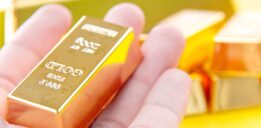The Best Ways to Buy Gold Bullion Cheaply, with Quality in Mind
Gold is one of the most valuable and time-honored assets known to humankind. In the new-normal world of runaway deficit spending, currency debasement, and debt monetization, owning it has never been more important. You may covet it for future expected price appreciation, or simply as a plain old hedge against uncertainty, but few argue it doesn’t have a rightful place in a modern-day portfolio. As such, many investors are clamoring to know how to buy gold bullion cheaply and legitimately to avoid counterfeits. This article seeks to illustrate the growing purchase options available at an investor’s fingertips, and other helpful tidbits.
How to Invest in Gold Bullion
How do you buy gold anyway? Good question. It all depends on whether the investor is looking for physical gold exposure or exposure through derivatives. Each offers its own set of advantages and drawbacks, as we shall see.
Physical Gold Ownership
Which gold coins to buy? How do you buy a gold bar? For the traditionalist, gold can still be purchased through all the classic outlets. Brick-and-mortar dealers are the most established option. These include banks, jewelers, and precious metals dealers—both with physical store locations and online. This is where an investor simply walks into a store and purchases gold outright, or pays for gold online to be shipped at a certain location. We’re all familiar with how that works.
Gold can be purchased in several weights and denominations. The most popular weights of the imperial system are: one ounce, 10 ounces, and 400 ounces. Those of the metric system are: one gram, 10 grams, and 500 grams. Gold can be purchased as coins (classic and newly-minted), cubes (Bitgold), or bars and ingots.
Once the physical gold has been purchased, the next step is planning where it will be stored and how it will be insured. For small amounts, some investors may be perfectly happy to store it at home for free.
But for larger amounts, banks and security firms offer services like vaulting, safety deposit boxes, and insurance. Investors opting for these services do so for the peace of mind knowing their gold will be safe from theft or unforeseen circumstance. While investors of large amounts of gold don’t generally worry about the trivial costs of vaulting and insuring gold, these fees can set them back 0.5% annually; not an insignificant sum over time.
The main benefit of holding physical gold is knowing that it isn’t exposed to counterparty risk. There is no fine print to read, or class action suit to join if anything goes wrong. No matter which financial institution blows up in the future, if it’s in your possession and you own the proof of purchase record, you own it…period. This isn’t necessarily the case with many gold derivative products.
The drawback? Physical gold is less liquid and cost-efficient than digital gold, for example. There are companies like GOLDMONEY INC (TSE:XAU) where fully-backed digital gold can be bought and sold any time of the day, with funds credited quickly. Spreads would be more favorable as well. The BitGold platform offers a standard buy/sell fee of 0.5%, whereas selling physical gold back to the bank might erode two to five percent off your holdings.
Exchange-Traded Funds (ETF)
For regular investors, ETFs are becoming the most popular way to invest in gold. The reason in a nutshell: convenience. Gold ETFs trade on a stock exchange like any other security, and millions of people enjoy instant access through their brokerage accounts.
The most popular gold ETF, SPDR Gold Trust (ETF) (NYSEARCA:GLD), owns millions of ounces of underlying gold backing, representing a percentage of each share. Since millions of shares trade hands each day (liquid), expense ratios are low, and the legal framework is rock-solid, more investors are choosing this hassle-free alternative. There are even certain tax advantages investors may procure from investing in these types of funds; most notably the ETF’s relative, the Exchange-Traded Note (ETN).
While the advantages are self-evident, how about the disadvantages? For ETFs with actual physical backing, counterparty risk is minuscule (however theoretically possible). The legal framework backing these products is such that should the ETF’s custodian fail, the fund’s gold should still remain protected. Counterparty and credit risk is more evident with funds not backed by physical gold, ETFs tracking an index, or an ETN. Please check the prospectus for further information about how an individual fund’s gold security is structured.
Otherwise, gold-backed ETFs are generally a more convenient, cost efficient, and practical way of owning physical gold bullion, albeit in “paper” form.
Top Non-Leveraged Gold ETFs
| Symbol | ETF Name |
| GLD | SPDR Gold Trust (ETF) |
| IAU | iShares Gold Trust(ETF) |
| DGL | PowerShares DB Gold Fund (ETF) |
| OUNZ | Merk Gold Trust |
| SGOL | ETFS Gold Trust |
Keep in mind, there are other types of gold products on the market which can offer exposure to gold prices. These may be leveraged ETFs or funds that invest in gold stocks as opposed to gold bullion itself.
Where to Buy Gold Bullion
Since 1793, when the first coins were struck, the U.S. Mint has been making coinage of various alloys. Among those are American Eagle 1 oz. gold coins, which boast 0.999 purity and are still popular today. Various weights and commemorations are available, and it’s not uncommon for rare older coins to sell well above their gold weight premium. Some collectors will do anything to get their hands on them.
Brick-and-Mortar Vendors
Can you buy gold coins from the bank? Absolutely. They are on the list which includes individual gold merchants, rare coin dealers. Recognized names like HSBC Holdings plc (LON:HSBA) and ScotiaMocotta, a division of the Bank of Nova Scotia (TSE:BNS), sell gold bars and coins to customers. They also offer vaulting services and safety deposit boxes for a fee. Many brick-and-mortar vendors also offer online platforms in which gold can be purchased for pick-up or delivery.
Needless to say, when dealing with a Tier-1 vendor like a bank, the quality of the gold is guaranteed. These vendors procure bullion only from dealers meeting rigid regulatory standards, and vaulted gold is usually audited yearly or bi-yearly. They are names that can be trusted.
Online Dealers
Many independent gold dealers are strewn across the internet, happy to exchange fiat for metal. Reputable companies have distribution channels to ship the gold to a physical location securely. The downside to this method is cost. It’s not inexpensive to ship and insure a valuable commodity like gold long distances. Depending on the dealer and amount, costs can range between three to six percent to safely transport it to a destination.
Investors may also have to pay more attention to the online dealer’s source of gold. While many (if not most) of these dealers are legitimate, there are dubious dealers willing to scam the unsuspected. Even online dealers not engaged in outright fraud may be more willing to source gold from less standardized networks. The pressure from working on thin margins in a competitive marketplace could lead to a quality compromise from the less reputable.
Some experts are sounding the alarm that fake gold coins are flooding the market. The quality of counterfeit gold has increased to the point where it can be extremely hard to detect. In fact, it’s gotten so good that professional dealers who handle gold daily can’t even tell the difference. (Source: “Glitters, but Not Gold: Fake Gold and Silver Coins ‘Flooding’ Market,” NBC News, June 12, 2016.)
The bottom line is that many would say that the U.S. Mint is still the best place to buy gold bullion. It is the most secure and trusted option, with hundreds of years of established service. But other options exist. Whichever vendor you prefer, make sure to do your homework and only purchase from trustworthy, liquid, and reputable dealers.
When to Buy Gold
The timing of an investor’s gold purchases usually depends on multiple factors. First and foremost, having the discretionary money to purchase gold is the first requirement. Without possessing the necessary funds, the “when” becomes moot.
When money isn’t a limiting consideration, some investors set as funds aside and purchase gold on a set schedule. Whether the price goes up or down matters not; the objective is to average cost buying to establish a baseline position over time. There are investment platforms that can purchase gold on a customer’s behalf automatically depending on certain parameters. Average cost buying is one of the more popular ones.
Another consideration is investment objectives. Do you view gold as a safe-haven asset or are you seeking capital gains? Answering this question will alter the timing of your purchases dramatically. Often times, how to invest in physical gold really depends on the end goal.
For example, for investors seeking capital appreciation, they may elect to wait until certain technical and fundamental signals come into alignment before making a significant purchase. Since gold has a tendency for long, multi-year consolidation phases, it makes no sense to purchase on a schedule like those seeking protection. Otherwise, you may literally wait decades before realizing a “return” on your investment.
Again, why would you invest in gold? Answer this question and the timing of purchases becomes self-evident.






